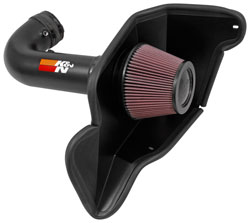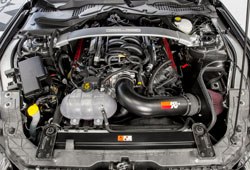|
He spent a good portion of his childhood from 7 to 14-years old in bed due to a heart valve leakage, but outgrew the problem. It was apparent as early as his days in high school that he was destined to have a career in automotive racing and production. He obtained his initial skills working on his own Willy automobile while attending Woodrow Wilson High School in Dallas, Texas. After graduating, he planned to attend the Georgia School of Technology to study Aeronautical Engineering. However, World War II changed things. He enlisted in the United States Army Air Corps and served as a flight instructor and test pilot. He ultimately left the service after the war with the rank of staff sergeant and then worked on oil wells and a poultry farm. He started racing cars as an amateur during the mid 1950s using a friend’s MG TC and a borrowed Cad-Allards. His early success in racing led to invitations to participate in the Aston Martin and Maserati factory racing teams during the mid and late 1950s. Some of the races he competed in included: • The 12 Hours of Sebring in an Aston Martin DBR1/300 in 1958 • The Mount Washington Hillclimb Auto Race in a specially prepared Ferrari 375 GP Roadster in 1956 • Formula One races from 1958 to 1959 • The 24 Hours of Le Mans in an Aston Martin DBR1 in 1959 He set U.S. and International speed records driving a modified, streamline supercharged Austin Healy 100S at the Bonneville Salt Flats, completed the Mount Washington HillClimb race in a record 10:21.8 seconds. In addition, he won eight World Championships and several non-championship races during his stint in Formula One. As he raced in the 1959 24 Hours of Le Mans, he noticed the performance of an AC-Motors-built racer, known as the Ace, which became the origin for his AC Cobra that was built three years later. He retired from racing in 1959 due to health issues and created a high-performance driving school and the Shelby-American Company, a manufacturer of custom high-performance automobiles. In his first venture Shelby asked AC Motors of England to design a new high performance car with a Ford V8 used in its popular AC Ace sports car. The car was dubbed the AC Cobra and Shelby obtained a license to import it into the United States. It soon became known as the Shelby Cobra. Ford Motors Invested in it from 1962 through 1965 and also provided financial support to Shelby American for the development of the Ford GT (also known as the Shelby Mustang) from 1964 through 1967. After Lee Iacocca left Ford, he asked Shelby to create high performance cars for his new employer, Chrysler. Shelby joined the board of directors and assisted Iacocca as the Performance Consultant. He was instrumental in the development of the Dodge Viper and help produced an assortment of Dodge Shelby cars including the Dodge Shelby Charger from 1983-1984, the Dodge Daytona Shelby Z from 1987-1988, and other cars from 1983 through 1989. In 2003, Shelby re-established ties with Ford to be the Technical Advisor in the development of the Ford GT. He is a member of the International Motorsports Hall of Fame, the Motorsports Hall of Fame of America, the Automotive Hall of Fame, and the SCCA Hall of Fame.
Two of the most recent Shelby Mustangs to be developed are the 2016-2017 Ford Shelby GT350 and the 2018 Ford Shelby GT500. A 5.2-liter flat plane crank V8 engine, also known as the Voodoo motor, which offers 526 horsepower and 429 lb-ft of torque powers the 2016 GT350. The car features track-focused chassis tuning, significant aerodynamic enhancements that include a lowered hood around the engine, two piece Brembo brakes, MagneRide damping option, lightweight Tremec 6-speed manual transmission, and Recaro seats. Other changes meant to make the car lighter include a carbon fiber reinforced polymer radiator support that guides cooling channels for many components. If you are still looking for more horsepower in your 2016 and 2017 Ford Shelby GT350, then consider buying the K&N 69-3538TTK Typhoon air intake system. This system has been rated to offer an estimated boost of 18.12 horsepower at 6400 rpm. It includes a free-flowing, mandrel-bent aluminum tube that reduces the airflow restriction caused by the factory intake. The tube helps smooth and straighten the airflow giving the engine more air, which helps it produce more power and acceleration throughout the engine RPM range. The intake also includes a washable and reusable K&N RP-2960 universal air filter with a carbon fiber top. The round-tapered filter features a media made of multiple layers of cotton gauze. The gauze has been treated with a special grade of oil that makes them very sticky so that they can catch and hold particles. K&N also offers the 99-5000 filter care service kit, which is specially formulated to clean and recharge the K&N air filter when it comes time to clean it. This means that the filter can be used over and over again and will be the only filter you will need for the life of your car. A heat shield is also included that blocks hot engine air from entering the intake. This helps assure that the air that flows to the engine is cool resulting in better performance. The air intake is designed to replace the factory intake system and the air filter and heat shield will fit into the factory air box location. The air filter installs easily using the existing factory mounting points. The whole process can be done in about 90 minutes using common hand tools. The K&N 69-3538TTK Typhoon Air Intake System fits the following vehicles: 2017 FORD MUSTANG SHELBY 5.2L V8 Fuel Injection - All Models |
|||
Friday, March 31, 2017
2016-2017 Shelby GT350 Models Gain Horsepower Using Air Intake Systems
Subscribe to:
Comments (Atom)

